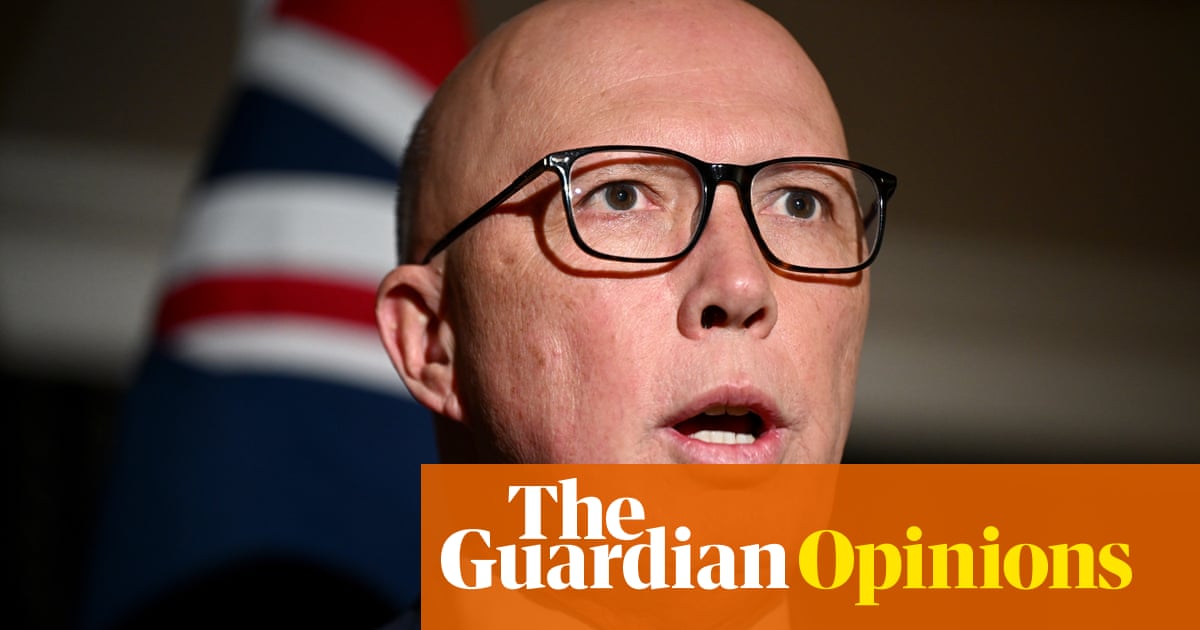Peter Dutton’s energy policy is a political death wish – and utterly irresponsible in the face of the climate emergency | Ian Lowe

Peter Dutton’s proposed energy policy, in the face of our climate emergency, is utterly irresponsible. Not just irresponsible environmentally, but also economically. Given community attitudes, it looks like the silliest political death wish in recent history.
Joëlle Gergis’s recent Quarterly Essay, Highway to Hell, was a frightening reminder of the price we are already paying for climate change. In property damage from floods and fires as well as lost agricultural production, the bills keep rolling in. As well as spending billions subsidising fossil fuels, we are spending billions more repairing the damage global heating is doing. It would be in our direct interest to be urging a rapid increase in ambition from the inadequate Paris targets. Becoming the first country in the world to weaken our response would undermine the growing impetus for a concerted program of action. We should be increasing the rate of decarbonisation, not slowing it.
The 2006 UMPNER report, chaired by the head of the Australian Nuclear Science and Technology Organisation (ANSTO), found that it would take at least 10 years, more probably 15, to build one nuclear power station – one of the dozen or so that would be needed for the Dutton proposal to replace our coal-fired units. It also said that the power would be 20% to 50% more expensive than the system was then providing.
CSIRO’s regular GenCost study confirms the cold financial truth. Recent world average prices of electricity from solar farms and wind turbines are about 4c a kilowatt hour. Nuclear power costs about 16c. Even adding in the price of the storage we need and the cost of increased grid connections, renewables cost far less than nuclear power. Deciding to replace our coal-fired power by nuclear would commit us to continuing to burn coal until well into the 2040s, as well as promising to increase the scale of our electricity bills. The economically responsible solution to climate change is renewables backed up by storage, plus an urgent investment in energy efficiency.
Twenty years ago, a report to the Howard government showed we could reduce our greenhouse gas emissions by 30% simply by using more efficient technology with payback times of less than four years. That should be a top priority. The introduction of vehicle efficiency standards is a long-overdue step in that direction. We should also be lifting appliance efficiency towards international best practice. That would save consumers money as well as slowing climate change.
As well as being economically and environmentally irresponsible, the proposed policy is politically impossible. The Howard government legislated a ban on nuclear power 25 years ago. Coalition governments in power for most of the time since then made no attempt to repeal that law. Several states also have legislation prohibiting nuclear power. Even the most naively optimistic Coalition MPs don’t believe there is any chance of a majority in both Houses that would be needed to change the national law. There is equally little chance of state legislation being changed. Even Dutton’s Queensland LNP colleagues, facing an election later this year, have been rushing to disassociate themselves from the whole idea.
So what about the politics? In the 2019 and 2022 elections, the Coalition lost seats such as Warringah and Kooyong, which have been under their control since time began. In every case, the independents elected campaigned on the need for more rapid action to slow climate change. The proposed policy is likely to strengthen the chances of all those independents being re-elected and increase the likelihood of their being joined by new winners in other seats. Since the last election, the scale of damage from climate change has continued to increase. The voters have shown they are willing to forego traditional party loyalties to elect independents who will push for more urgent action. Coalition candidates must be shaking in their boots.
after newsletter promotion
Source: theguardian.com

